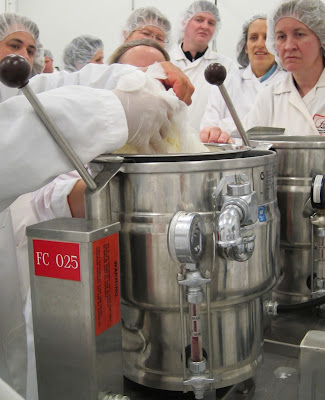Table Talk: A Menu for the Future
Strengthening our Food Community
A light-hearted impulse initiated my tour of culinary businesses in Victoria, but it has taught me a great deal in a very short space of time and will influence my buying habits in the future.
The owners of the small businesses I’ve visited care passionately about providing quality food to their customers. For some of them, quality food must be organic. For others, it must be local, while still others stock their shelves with the best the world can provide. But the differences are insignificant compared to the underlying shared belief in the importance of food to nourish and give pleasure and in the importance of creating a community and an ongoing relationship with your customers.
Victoria’s food business community is incredibly strong. They are on a first-name basis; they refer customers to each other or stock each other’s products. They support each other and are trying to build their community. Unfortunately, I don’t think the food-consuming community is as strong.
Trevor Walker, owner of Plenty Epicurean Pantry, coordinates Table Talk, a monthly discussion series about food and sustainability. I was fortunate enough to be able to join the group on July 7 as nine of us enjoyed a warm summer evening in the garden behind the store. As we feasted on organic chocolate chip cookies, lemon loaf and local strawberries, we discussed the serious, sometimes frightening topic of developing a just food system.
It’s a big topic, and I am not going to attempt to cover it in a short blog post, but I do want to record some of the comments I heard around the table in the hopes that they will stimulate your thinking.
- There is a lack of control over what is in the stores. Consumers can’t choose what will be available; they can only react after the fact (e.g. by boycotting certain products). For example, what do you do if you really want to buy organic, fair trade bananas, but they’re not available in local stores?
- How can consumers give stores their stamp of approval to indicate support for businesses that avoid waste by recycling and composting or that sell fair trade products?
- There is too much information and too much greenwashing. Consumers don’t know how to choose, and they don’t know who to trust.
- There’s a backlash against organic food. It’s seen as expensive and elitist.
- We’re no longer part of an agricultural community. We no longer understand what is involved in growing food.
- Food can create community, and there are ways of strengthening our food community – cooking classes for kids, canning workshops, matching elder farmers with young people, farm tours.
Table Talk has been following a six-week discussion series from the Canadian Earth Institute, an affiliate of the Northwest Earth Institute in Portland, Oregon. Menu for the Future explores the connections between food and sustainability by discussing food systems and their impact on culture, society and ecological systems and the role individuals can play in promoting personal and ecological well-being and sustainable food systems.





Comments